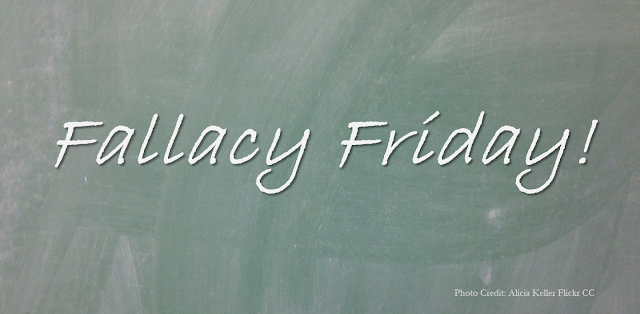The opposite of the hasty generalization, this fallacy occurs when someone refuses to draw the appropriate conclusion from a clearly recognized pattern; the phrase “despite overwhelming evidence” is an indication that someone is about to commit this fallacy. Their refusal to accept what is most likely true is usually due to either their not really caring about the truth or their having a vested interest in their position (for example, cognitive dissonance occurs when someone is emotionally invested in a position and therefore likely to dismiss evidence against their position).
It can also occur by accident as someone tries to avoid the anecdotal fallacy (drawing conclusions on individual experience rather than conclusive evidence), which is generally a wise precaution. However, it is logical to examine the anecdotes to try to discern whether a pattern is present or not. A classic example of slothful induction is Charlie Brown’s continual attempts to kick the football even though Lucy has consistently pulled it away from him. Not all instances of this fallacy are as innocuous, however; some can be dangerous (see “Darwin Awards.”).
Examples:
“Just because I’ve had 12 car accidents in the past six months doesn’t mean I’m a bad driver.”
“Poll after poll shows that the N.D.P will win fewer than ten seats in Parliament. Yet the party leader insists that the party is doing much better than the polls suggest.” (The N.D.P. in fact got nine seats.)
The polygamist has had twelve wives for twelve years but no children. He says, “I just can’t imagine what is wrong with all those women!” (A very common misconception is that women are the cause of most infertility problems.)
“Bill’s client satisfaction rates are very low, and he’s been fired by 17 clients in the last 3 months. I guess he’s just been really unlucky.”
“Jane isn’t addicted to alcohol. She just likes to drink a lot and has had a rough past few years.”
“Even though over 99% of climate scientists say that human-induced global warming is occurring, I don’t think it’s possible.”
“Even though all the evidence from multiple fields of science support the evidence for evolution, I still believe that God made us 6,000 years ago.”
“Sure that drug has been fatal in 100 previous tests, but how do you know some unknown factor wasn't present causing the deaths? Maybe the drug is perfectly safe.”
“Failure to infer that these round, shiny, bright berries are likely to be poisonous from the fact that those other round, shiny, bright red berries produced frothing at the mouth and then death in one’s companion yesterday may well lead to trouble for oneself today.” (Wielenberg, God and the Reach of Reason, p. 90)
The Brown & Williamson Tobacco Corporation stated: “It is our opinion that the repeated assertion without conclusive proof that cigarettes cause disease – however well-intentioned – constitutes a disservice to the public.” (Agin, Junk Science, p. 89)
Tobacco Institute of Hong Kong: “The view that smoking causes specific diseases remains an opinion or a judgment, and not an established scientific fact.” (Agin, Junk Science, p. 89)
“It is possible that a materialistic explanation of consciousness might be found, but that does not make the claim that consciousness is non-physical an argument from ignorance... At any given time, scientists should infer the best current explanation of the available evidence, and right now, the best evidence from both neuroscience and rigorous philosophical analysis is that consciousness is not reducible to the physical. Churchland’s refusal to draw this inference is based not on evidence, but on what Karl Popper called "promissory materialism," a reliance on the mere speculative possibility of a materialistic explanation. Since this attitude can be maintained indefinitely, it means that even if a non-materialist account is correct (and supported by overwhelming evidence), that inconvenient truth can always be ignored. Surely the project of science should be one of following the evidence wherever it leads, not of protecting a preconceived materialist philosophy.” (Menuge, Evangelical Philosophical Society Blog, Oct, 23, 2008.) (Not only are they committing a slothful induction, they are also committing the fallacy of shifting the burden of proof).
“Once upon a time two explorers came upon a clearing in the jungle. In the clearing were growing many flowers and many weeds. One explorer says, ‘Some gardener must tend this plot.’ The other disagrees: ‘There is no gardener.’ So they pitch their tents and set a watch. No gardener is ever seen. ‘But perhaps he is an invisible gardener,’ the Believer says. So they set up a barbed-wire fence. They electrify it. They patrol with bloodhounds. But they hear no shrieks that would suggest some intruder had received a shock. No movements of the wire ever betray an invisible climber. The bloodhounds never give a cry. Yet still the Believer is not convinced: ‘But there is a gardener, invisible, intangible, insensible to electric shocks, a gardener who comes secretly to look after the garden which he loves.’ At last the Skeptic despairs: ‘But what remains of your original assertion? Just how does what you call an invisible, intangible, eternally elusive gardener differ from an imaginary gardener or even from no gardener at all?’” (Smith, Ethical and Religious Thought in Analytic Philosophy of Language, p. 24.)


No comments:
Post a Comment